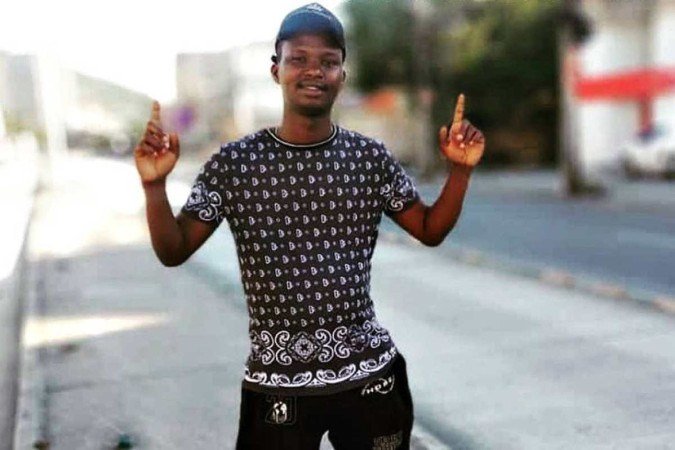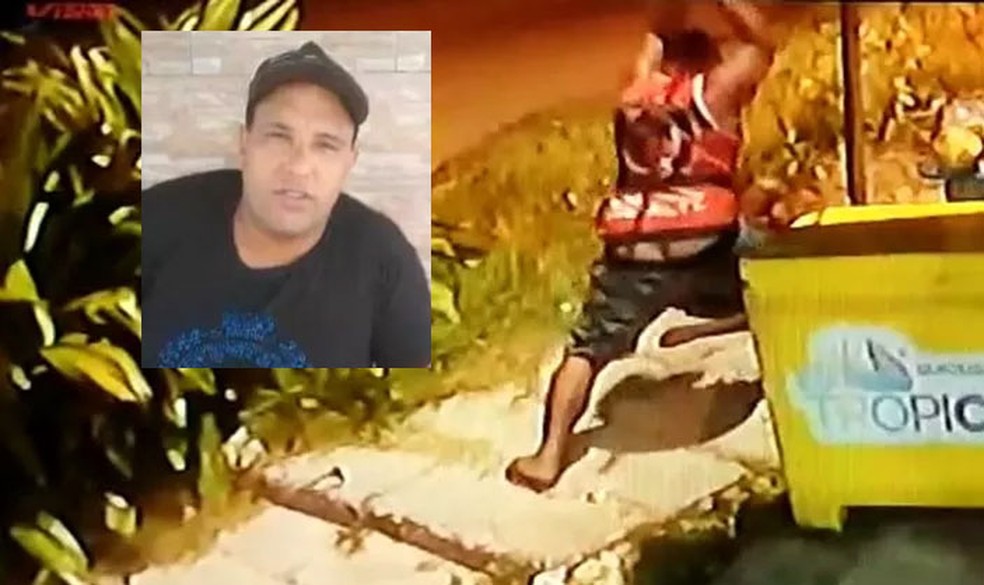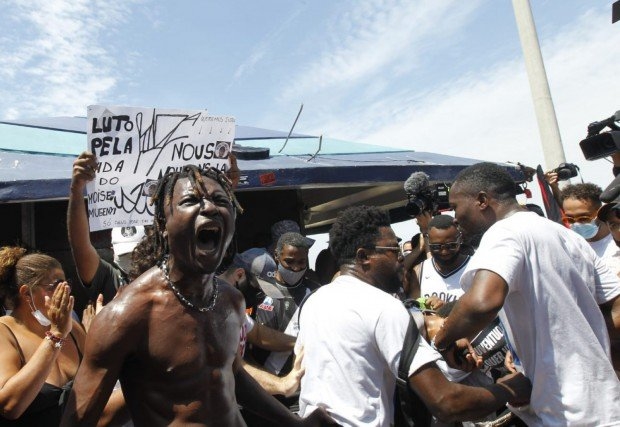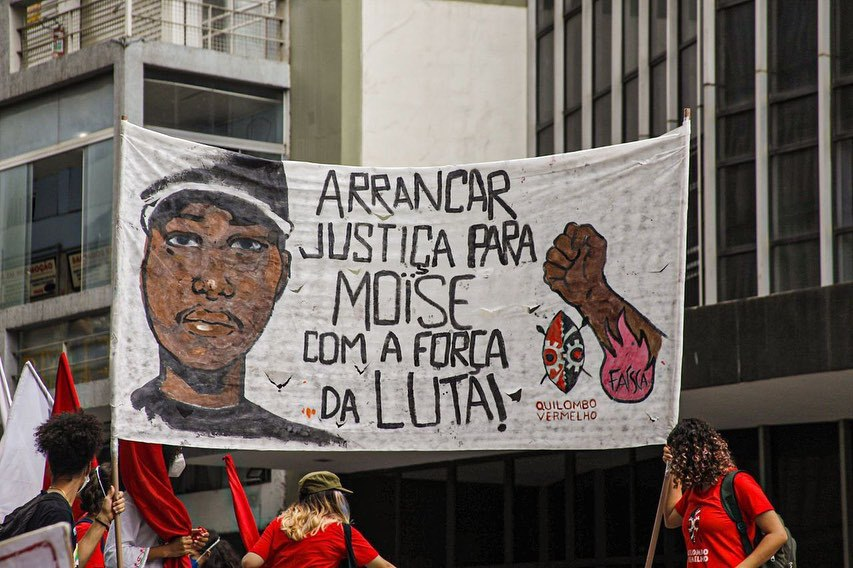Young Congolese Political Refugee Beaten to Death in Brazil
Brazilians occupied the streets of at least 12 provincial capitals and several cities in the country on Saturday, February 5, to protest against racism, xenophobia and the brutal death of Moïse Kabagambe. Kabagambe, a 24-year-old political refugee from the Democratic Republic of Congo, was beaten to death by several people on January 24 at the beachfront Tropicália kiosk in the city of Barra da Tijuca in Rio de Janeiro.
Despite the heinous violence, Moïse’s death wasn’t initially publicized in the mainstream media, so his family and supporters staged an act of disobedience on January 29 by blocking traffic on a busy road in Rio de Janeiro, putting themselves at risk of reprisal from the local authorities.

The Beating of Moïse
According to his family, Kabagambe went to the Tropicália kiosk on January 24, in the Barra da Tijuca beach, to collect payment of R$200 for working two days. A group of four men, including the business owner, ended up attacking and beating Kabagambe.
Video of the incident, which has circulated widely on the internet, shows Kabagambe arriving at the outdoor kiosk and getting into an argument with the attendant, taking off his shirt, and opening an outdoor freezer. While reaching inside the freezer, the group of men subdued him and began beating him with a wooden club for nearly 15 minutes, claiming the life of the young Congolese.
After the fatal beating, Moïse’s body was tied to a ladder next to the kiosk. Meanwhile, the aggressors continued working as if nothing had happened.
A witness to the young man’s beating said that the attackers told her that Moïse was a robber and asked her not to look. Emergency medical services arrived nearly half an hour later.
Three men were later arrested for the fatal beating. The men claim they were not beating him for racist or xenophobic reasons and the owner of the kiosk said Kabagambe was not there collecting a debt.

The Kabagambe Family
Fleeing the wave of violence and poverty that has suffocated the Congolese people for years, Moïse’s family found an opportunity for a fresh start and to get out of the country. Thus in 2014, he, his mother and brothers came to Brazil as political refugees.
To help maintain the house, Moïse provided services at kiosks in the Barra da Tijuca region of Rio de Janeiro.
After Moïse was beaten to death, the family reports being afraid of living in Brazil and of walking on the street. Kabagambe’s mother, Ivana Lay said she felt the “violence was motivated by racism” and told reporters she left Congo for safety and yet her son was killed.
“My son had his ribs and neck broken. I fled the Congo so they wouldn’t kill us. And in the end, they killed my son here, as they kill in my country, by beatings.”
Ivana Lay, Moïse Kabagambe’s mother
The family mobilized an initial protest and blocked roads five days after his death, calling for an investigation into Kabagambe’s death.
Three Perpetrators Arrested Three Days After Protest
Three days after the first demonstration organized by the family, the police arrested the three suspects for doubly qualified murder with impossibility of defense and use of cruel means: Fábio Pirineus da Silva, Aleson Cristiano de Oliveira Fonseca and Brendo Alexandre Luz da Silva.
All admitted to the crime, however, in a video that circulates on social media, the aggressor Aleson said that “no one wanted to take his life.” This same aggressor who reported not having the intention to kill Kabagambe took the wooden club from the hand of another participant and struck Kabagambe repeatedly.
Many on the ground believe that if it weren’t for the initiative of the organizers and family to put on the first demonstration, the fatal beating of Moïse Kabagambe may not have been known.
Local residents believe local police and the state neglected this case and attempted to cover it up because the country has anti-Black ideals.
“Moïse’s killing show that the spilled Black blood does not move, does not shock, is worthless in the eyes of the elite and the Brazilian state. This takes us to the era of enslavement, where the Black body was violated and exposed in the public square to serve as an example for all those who practiced disobedience, even if it was for their rights.”
Anonymous civilian in Brazil
Tentacles of the Extreme Right & Large Protests
With the arrival of Jair Messias Bolsonaro to power in January 2019, many workers’ rights were withdrawn. The power of unions that represent the interests of the people was weakened. Bosses were granted more freedom to mistreat their workers. The minimum wage was lowered and Bolsonaro closed the country’s 88-year-old Ministry of Labor.
In Moïse’s case, he was an ex-employee dealing directly with the boss. He was a young man who fled the war in his country and he ended up losing his life at the hands of the children of the mother country that had welcomed him. The boss and owner of the kiosk, Carlos Fábio da Silva, remains uncharged.
After the three men were charged and the media told the story, widespread condemnation swept the country.
Large protests were held on Saturday, February 5, across large Brazilian centers such as São Paulo, Porto Alegre, Rio de Janeiro, Salvador, Belo Horizonte and Ceará, bringing together big names and entities of the national Black movement who symbolize the fight against all prejudice in Brazil.
The acts, or demonstrations, served to remember the murder of Kabagambe and demand justice and punishment for those responsible.
The city government announced that the kiosk where Moïse Kabagambe was killed will become a memorial to African culture, and at first it will be managed by the family of the dead young man.


Cover image via Midia Ninja.
Unicorn Riot's Coverage From Brazil:
- ‘Marielle, Presente’ – March Marks Feminist Struggles in Brazil - April 13, 2023
- Over 100 Families Occupy Abandoned Apartment Complex in Brazil - February 20, 2023
- Bolsonarist Extremists Attack Brazilian Government a Week After Lula Inauguration - January 12, 2023
- Elder Woman Released After 27 Years of Slave-like Servitude in Brazil - January 5, 2023
- With Lula Elected President of Brazil, the Left Consolidates itself as a Power in South America - November 9, 2022
- Elections in Brazil: Second Round Slated for October 30 Between Lula and Bolsonaro - October 7, 2022
- Ribeirão Favel’Arte, Festival of Arts and Culture in Brazilian Favelas - September 7, 2022
- Indigenous Official and British Journalist Murdered in Brazilian Amazon - July 7, 2022
- ‘Bolsonaro Never Again’ Protests Come Among New Wave in Government Scandals - May 19, 2022
- COVID Commission Finds Bolsonaro Committed “Crimes Against Humanity” - December 15, 2021
- Brazil: 600K Deaths, Emergency Aid Ends, Protests Continue, & People Call for Lula 2022 - October 9, 2021
- Brazil: Mutual Aid During COVID-19 and Bolsonaro’s Mismanagement - September 19, 2021
- Police in Brazil Killed Record Amount of People in 2020 - September 8, 2021
- Are the “Fora Bolsonaro” Protests Enough? - August 26, 2021
- Brazil: Hoping for a Vaccine, Food on the Plate and #ForaBolsonaro - July 9, 2021
- Brazil: The People, at Last, Took to the Streets - June 3, 2021
- The Invisible “THEY” - Apr. 29, 2021
- “Brazil is Asking for Help” – Artists and Activists Speak Out - Apr. 10, 2021
- Brazilian Pandemonium: COVID-19 Kills Over 300K - Mar. 27, 2021
- Brazil Nears 200K Deaths as Politicians Continue to Downplay COVID-19 - Dec 20, 2020
- Echoes of George Floyd in Brazil: Man Kneeled On, Killed by Security Guard - Nov 23, 2020
- The Coronavirus Crisis in Brazil – An Interview with EmiciThug - May 22, 2020
- “Enough of Being the Blood that Promotes Fascists”: Viewpoints From Brazil - May 15, 2019
Follow us on X (aka Twitter), Facebook, YouTube, Vimeo, Instagram, Mastodon, Threads, BlueSky and Patreon.
Please consider a tax-deductible donation to help sustain our horizontally-organized, non-profit media organization:



